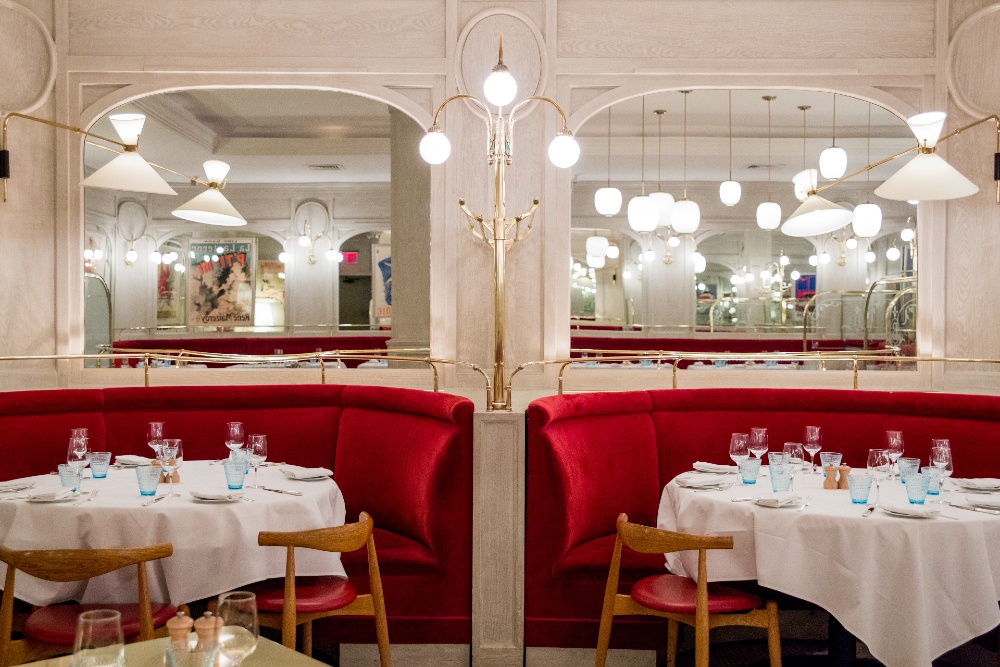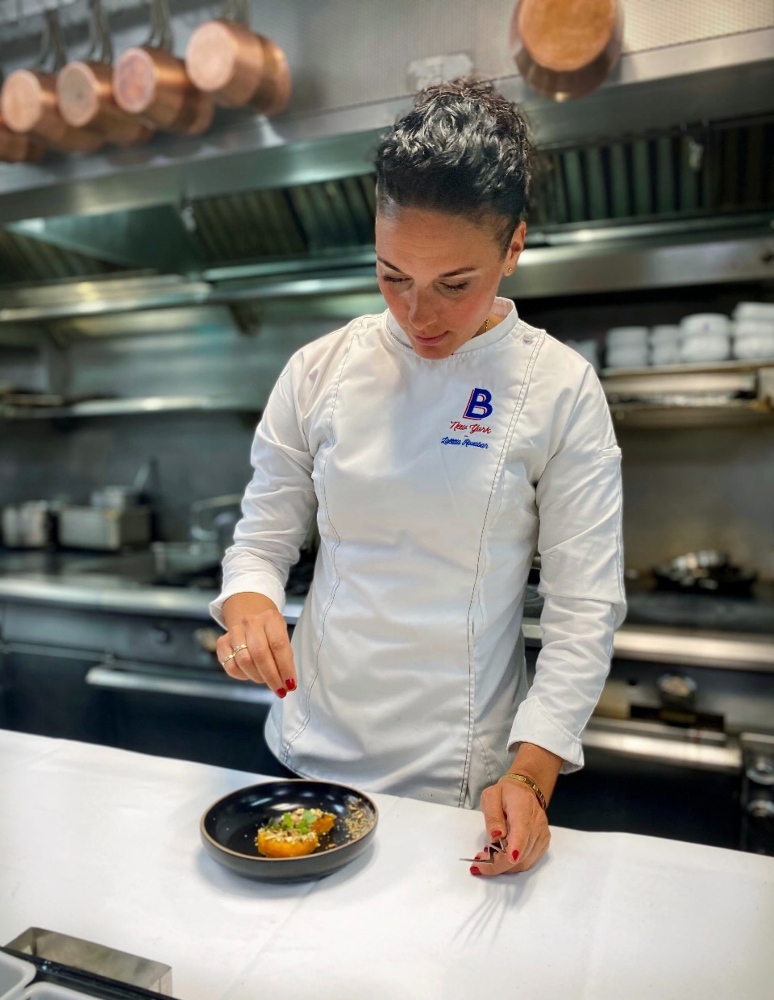The sun is shining in New York and the temperature is already rising on this late May afternoon. “We’ll need to put out some fans,” says the chef. While drinking a coffee on the terrace of Benoit, the iconic French bistro on West 55th Street halfway between MoMA and Central Park, Laëtitia Rouabah watches her customers, waiting staff, and the seating arrangements. Having spent five years at the head of Alain Ducasse’s only restaurant in New York, “Chef Laëtitia” has seen it all: the challenge of revamping a traditional establishment, the satisfaction of putting in so much work (“2019 was the best year; we had celebrated Benoit’s ten-year anniversary the year before and we were always fully-booked”), the brutal shutdown due to Covid, the deserted streets, and the task of starting over and doing more with less by focusing on the terrace and takeout sales. “We reopened on May 29, 2020, when restaurants were allowed to serve outdoors. We built the terrace ourselves after each service, and slowly improved it so it would be fit for the winter.”
A year on, and New York’s eateries are once again able to welcome their customers indoors – but the terrace at Benoit has become a permanent fixture. What’s more, diners love it. “Everyone is back, it’s crazy! The restaurant is doing better than ever, even though there are no tourists. New Yorkers have understood that they can come back, and that they’d be missing out if they didn’t.” This tireless, plain-spoken chef is driven by the ideal of “a good job well done.” She grew up in a town just outside Paris and worked in the French capital and London before moving to New York. “I’ve always been a foodie at heart, and I would constantly tell my mother – who also cooked a lot – that I wanted to become a professional chef. But my guidance counselors in school didn’t agree. They thought it was a dead-end street…”
Crossing the Atlantic
Despite the discouragement, Rouabah’s dead-end street became a yellow-brick road. After graduating from hospitality school in Versailles in 2004, she joined the Relais Plaza, the bistro at the Plaza Athénée, one of the most renowned palace hotels in Paris. This is where she met Alain Ducasse – whom she still calls le chef. “Everything I know, I learned it from the chef,” she says, making no attempt to hide her admiration. After three years at the Relais Plaza, she followed him to London for the opening of Alain Ducasse at The Dorchester, which had picked up three Michelin stars by 2010. Rouabah later returned to France as sous-chef at the Jules Verne, nestled on the second floor of the Eiffel Tower, before becoming executive chef at Air France’s La Première lounge at Roissy-Charles de Gaulle airport. She then took the reins of Allard, an iconic bistro traditionally managed by women in the Saint-Germain-des-Prés neighborhood.


After her prestigious roles in European bistros, she landed in New York in 2016, tasked with gently rejuvenating the image of Benoit, one of Ducasse’s two restaurants in the United States alongside the Rivea in Las Vegas. The Monagascan chef (who was forced to abandon his French nationality upon becoming a citizen of Monaco in 2008) has an empire of some thirty restaurants across three continents: He is one of the world’s most acclaimed chefs, and the only one to have held three Michelin stars for three establishments simultaneously (in Monaco, London, and Paris). However, he has not been as lucky in America, where his luxury gourmet restaurant, Alain Ducasse at the Essex House, closed in 2007 having failed to find its following. A more traditional eatery, Benoit opened the year after, offering premium bistro fare. The name is taken from a famous Parisian restaurant opened in 1912, which Ducasse took over in 2005 before launching another branch in Tokyo.
“Benoit isn’t somewhere people go to be surprised,” says Rouabah. “Customers come for dishes like roast chicken, croque-monsieurs, and quenelles. Since I arrived, I have tried to create a new atmosphere by opening the restaurant up to a more contemporary cuisine. We can be a little more creative and add extra technique. We are restyling things, but as the chef says, we aren’t changing the restaurant’s identity.”
Showcasing Female Chefs
Arriving in New York was a big shock – despite having little time to experience her new home. “We had to work so hard, so I wasn’t able to go to museums or explore the rest of the country. It’s an amazing city; I was totally overwhelmed. There are so many restaurants, a melting pot of every ethnicity you can imagine. It makes you feel like you can do anything.” But the city’s energy is also a challenge for restaurants. “At Benoit in Paris, people come for the tradition. Here, you have to constantly offer something new, and everything happens so fast. Our restaurant already had a history behind it, so we had to draw on that while revamping it a little.” The initiatives included the launch of a pop-up menu four years ago in collaboration with the popular Brooklyn smokehouse Hometown Bar-B-Que, and a series of dinners created with other female chefs such as Dominique Crenn from Atelier Crenn in San Francisco.
Based in Long Island City in Queens, Rouabah used to bike across the East River to get to work – until she was hit by a car just in front of the restaurant last October. She came through the ordeal with a “crushed knee.” Two surgical operations later, she is still recovering and is continuing her physical therapy sessions in the hope of “cycling again soon.”
After five years spent in the kitchens at Benoit – a record in her career – Rouabah says she is “above all happy to have shown how hard we work. I’m someone with very high standards, but always with a focus on the customer.” She only regrets that this hard work has not led the restaurant to receive a Michelin star. “This place doesn’t need one, but the two other Benoit branches have a star, and I’d like one too!”
Article published in the July 2021 issue of France-Amérique. Subscribe to the magazine.












